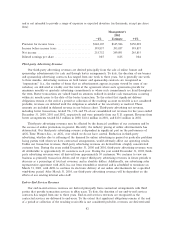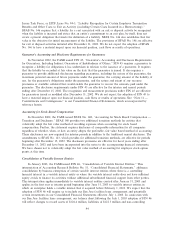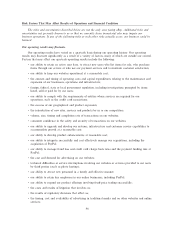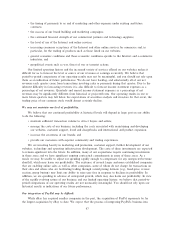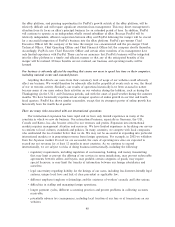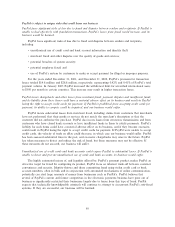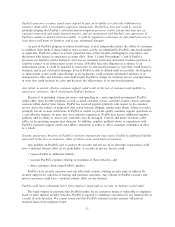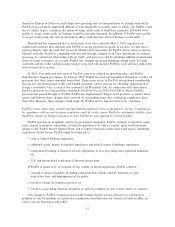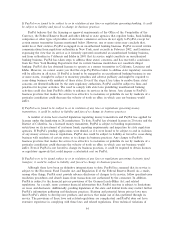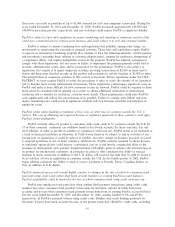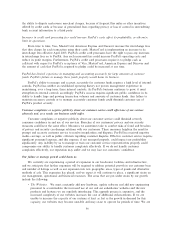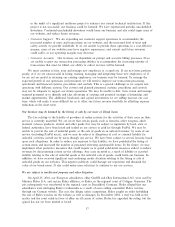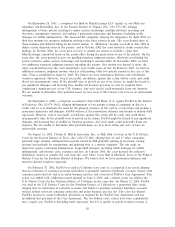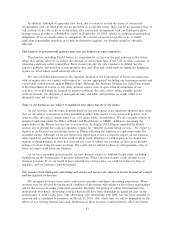eBay 2002 Annual Report Download - page 54
Download and view the complete annual report
Please find page 54 of the 2002 eBay annual report below. You can navigate through the pages in the report by either clicking on the pages listed below, or by using the keyword search tool below to find specific information within the annual report.PayPal's payment system might be used for illegal or improper purposes, which could expose it to
additional liability and harm its business.
Despite measures PayPal has taken to detect and prevent identity theft, unauthorized uses of credit
cards and similar misconduct, its payment system remains susceptible to potentially illegal or improper
uses. These may include illegal online gambling, fraudulent sales of goods or services, illicit sales of
prescription medications or controlled substances, software and other intellectual property piracy, money
laundering, bank fraud, child pornography traÇcking, prohibited sales of alcoholic beverages and tobacco
products and online securities fraud. Despite measures PayPal has taken to detect and lessen the risk of
this kind of conduct, these measures may not succeed. The processing of these payments could expose
PayPal to liability. In addition, future regulations under the USA PATRIOT Act may require PayPal to
revise the procedures it takes to verify the identity of customers and to monitor more closely international
transactions. PayPal's business could suÅer if customers use its system for illegal or improper purposes, or
if usage of its system is reduced because of increased veriÑcation requirements.
PayPal's discontinuance of its processing of payments for online gambling merchants will reduce its
revenue and proÑts; its past processing of these accounts could subject it to liability.
PayPal completed its exit from the business of processing payments for online gambling merchants in
November 2002. Approximately 6% of PayPal's revenues in 2002 were derived from this business. The loss
of these revenues and related proÑts will adversely aÅect PayPal's Ñnancial results. As a result of having
been in this business, PayPal has become subject to two inquiries related to payments made through its
service to online gambling merchants. In August 2002, PayPal reached agreement with the Attorney
General of the State of New York that it would cease processing payments from its New York members
to such merchants and pay the State of New York $200,000 in penalties and disgorged proÑts and to cover
the cost of investigation. Beginning in July 2002, PayPal provided documents and information related to its
services to online gambling merchants in response to a federal grand jury subpoena issued at the request of
the U.S. Attorney for the Eastern District of Missouri. On March 28, 2003, PayPal received a letter from
the U.S. Attorney for the Eastern District of Missouri indicating its contention that PayPal's provision of
services to online gambling merchants violated 18 U.S.C. Û 1960 of the USA PATRIOT Act, which
prohibits the transmission of funds that are known to have been derived from a criminal oÅense or are
intended to be used to promote or support unlawful activity, thereby subjecting PayPal to potential civil
forfeiture of the amounts it received in connection with such activities as well as potential criminal
liability. The letter oÅered a complete settlement of all possible claims and charges from the
U.S. Attorney for the Eastern District of Missouri if Paypal paid the purported amount of its earnings
derived from online gambling merchants during the nine-month period from October 26, 2001 to July 31,
2002, plus interest. PayPal acted in the good faith belief that its conduct did not violate 18 U.S.C. Û 1960
and PayPal calculates that the amount of its earnings from online gaming activities was less than asserted
in the letter. Should this investigation lead to a civil or criminal charge against PayPal, we would be
harmed by negative publicity, the cost of litigation and the diversion of management time, even if PayPal
ultimately prevails. Any Ñnding of a civil or criminal violation by PayPal, or potentially any settlement,
could also endanger PayPal's ability to obtain, maintain or renew money transmitter licenses in
jurisdictions where it requires such licenses to operate, which would materially harm our business.
Changes to card association rules or practices could negatively aÅect PayPal's service and, if it does not
comply with the rules, could result in a termination of PayPal's ability to accept credit cards. If PayPal is
unable to accept credit cards, our business would suÅer.
Because PayPal is not a bank, it cannot belong to and directly access the Visa and MasterCard credit
card associations or the Automated Clearing House, or ACH, payment network. As a result, PayPal must
rely on banks and their service providers to process its transactions. PayPal must comply with the
operating rules of the credit card associations and the National Automated Clearing House Association, or
NACHA, as they apply to merchants. The associations' member banks set these rules, and the
associations interpret the rules. Some of those member banks compete with PayPal. Visa, MasterCard,
52


